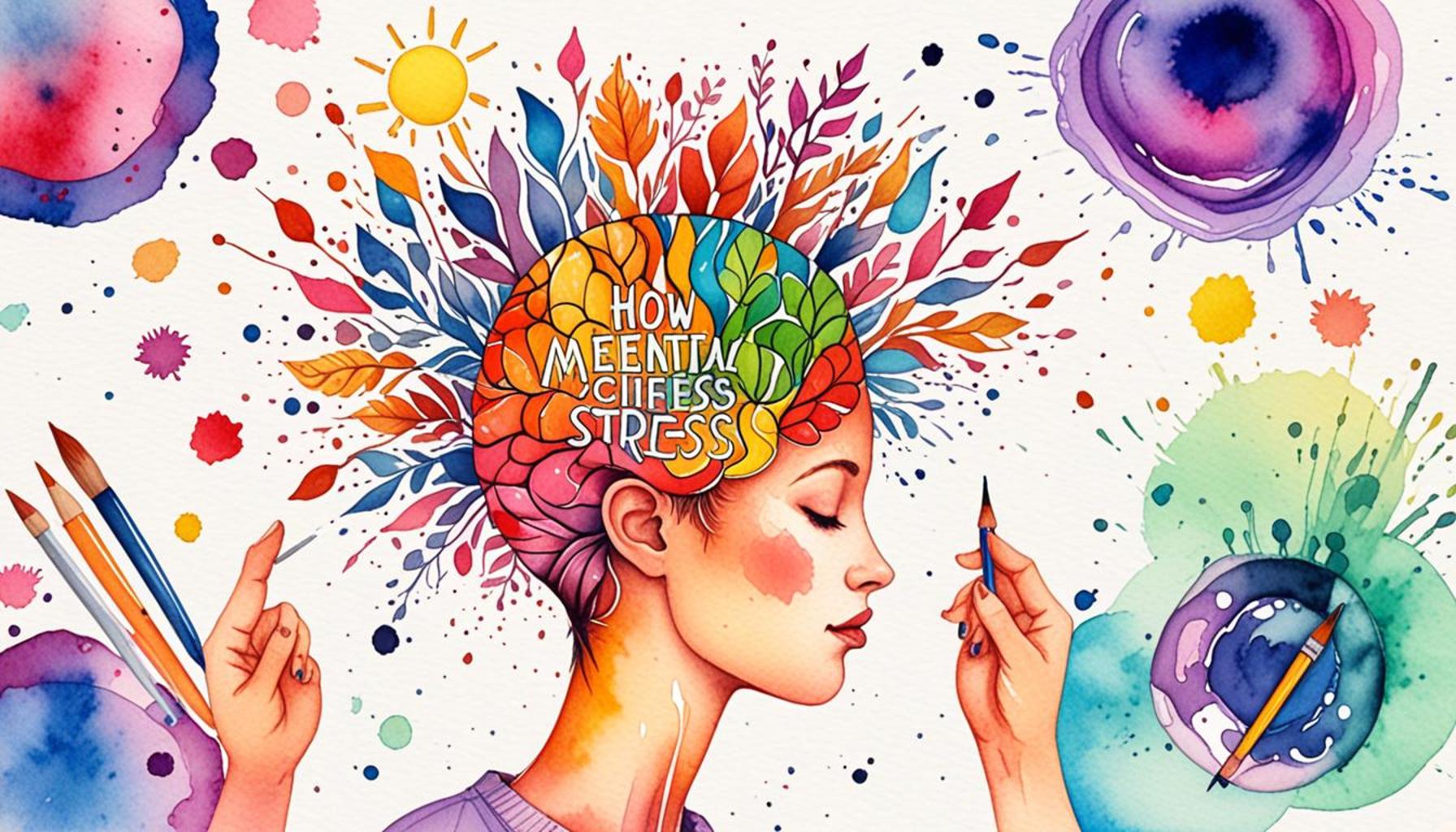How to Use Mental Challenges to Effectively Reduce Stress

Unlock Your Mind’s Potential
The modern world is filled with stressors that can easily overwhelm our daily lives. Finding effective ways to manage stress is crucial for maintaining both mental and physical well-being. One often overlooked method is engaging in mental challenges, which not only stimulate the brain but also provide a distracting escape from daily pressures.
Benefits of Mental Challenges
Mental challenges come in various forms, from puzzles to strategic games, and they play a significant role in stress reduction. Here are some key benefits:
- Enhances cognitive function: Encourages problem-solving and critical thinking.
- Increases focus: Diverts attention from stressors and anchors your mind.
- Promotes relaxation: Offers a fun and engaging way to unwind.
In this article, we will explore the Top 5 mental challenges designed specifically to help reduce stress and improve your overall mood. Prepare to embrace a world of entertaining yet beneficial activities that could transform your approach to stress management.
ADDITIONAL INSIGHTS: Expand your understanding here
Top 5 Ways to Use Mental Challenges to Reduce Stress
In today’s fast-paced world, stress lurks around every corner, affecting mental health and well-being. While stress is unavoidable, embracing effective strategies to manage it can transform your life. One intriguing approach is to engage in mental challenges, which not only provide a distraction but also enhance cognitive function and emotional resilience. Mental challenges serve as a dual-purpose tool: offering relaxation while sharpening your mental acuity. Below is a ranked list exploring five compelling methods to incorporate mental challenges into your stress management routine, beginning with the fifth most effective strategy.

5. Solve Puzzles Regularly
Puzzles are more than just a pastime; they are a comprehensive exercise for your mind, providing a necessary respite from life’s stressors. Engaging with puzzles like crosswords, Sudoku, and jigsaws is akin to a mental workout aimed at improving problem-solving abilities and elevating mood. Here’s why each puzzle type can be beneficial:
- Crosswords are a staple for enhancing vocabulary and general knowledge. They require not only a good grasp of language but also lateral thinking to decipher the creator’s intent behind each clue.
- Sudoku offers a rigorous mental challenge through its logic-based grid structure, fostering enhanced numeric skills by training your brain to recognize patterns and sequences.
- Jigsaw puzzles tap into visual-spatial reasoning skills, promoting patience and creativity as you connect hundreds of disparate pieces into a coherent image.
Regularly solving puzzles not only shifts focus away from stress but also instills a sense of achievement, boosting your psychological state. Establishing a daily routine dedicated to puzzle activities could enhance these benefits. For instance, you can allocate 15 to 30 minutes in the morning, a time when your mind is fresh, to enjoy this mentally engaging experience.
4. Engage in Brain Games
The realm of brain games is expansive, utilizing digital platforms to craft challenges that test speed, attention, flexibility, and memory. Games such as Lumosity and Peak serve as personal trainers for your brain, offering unique exercises tailored to increase cognitive capabilities.
These applications tap into skill development through science-backed tasks that foster quick thinking and mental agility. With a wide array of games designed to target various mental faculties, brain games ensure that all corners of the brain are activated and engaged.
Additionally, brain games can become a social experience. Whether you challenge friends online or participate in group sessions, the shared activity can build supportive bonds. The social aspect is crucial, as connectivity and shared laughter often act as wonderful counterbalances to stress.
3. Explore Mindfulness and Meditation Puzzles
Mindfulness presents an invaluable tool to maintain mental clarity and emotional stability. By incorporating mindfulness, you can achieve profound levels of relaxation. Mandala coloring and guided imagery exercises introduce a meditative layer to problem-solving that encourages calmness and reflection.
Activities such as crafting intricate designs or coloring repetitive patterns tap into creative faculties, providing stress relief as you immerse yourself in a world where relaxation and concentration coexist. These exercises promote mental quietude, helping to quell anxiety and fuel resilience.
The peaceful nature of these activities may encourage a reflective state ideal for unwinding from the day’s stress. Spending even a short time engaging in these creative pursuits leads to improved attention and emotional regulation, essential components in the journey towards optimal stress management.
2. Join a Puzzle or Game Club
While solitary reflection has its value, social interaction adds a further dimension in tackling stress. Joining a community centered on mental challenges—be it a book club, board game group, or puzzle gang—offers camaraderie that transforms mental exercises into shared achievements.
By meeting like-minded individuals regularly, the friendships and support systems that form strengthen your emotional well-being. The joys and frustrations of puzzle-solving become a shared experience, enriching the challenge. Whether through competition or collaboration, the sense of collective success fosters a network that provides additional resilience against stress.
Puzzles or games in a group setting turn into an opportunity for dialogue and laughter, creating an uplifting environment and reinforcing the notion that stress can be managed not just as an individual, but as part of a community.
1. Embrace Critical Thinking Challenges
The art of critical thinking revolves around analyzing facts to form a judgment. By embarking on challenges that require deliberate thought—logic puzzles, debates, strategy games—you engage a complex array of mental processes.
Games like chess demand strategic planning and foresight, enhancing your ability to think several steps ahead. Other activities, such as escape rooms, hinge on collaborative efforts to solve clues—a metaphor for life’s complex situations. By steadily practicing these activities, your mind learns to shift from dwelling on stressors to actively seeking solutions.
In a world filled with constant change, this mindset proves invaluable. Critical thinking challenges encourage you to approach problems holistically and seek efficient solutions. This adopts a proactive rather than reactive attitude toward stress, aiding in the cultivation of mental resilience.
In conclusion, mental challenges provide a unique pathway to effectively manage stress. Whether through puzzles, brain games, social interactions, mindfulness, or critical thinking, embedding these exercises into your daily routine promises a plethora of benefits. Not only are you fostering an environment of mental growth and relaxation, but you are also actively working towards a balanced, healthy lifestyle. Engage your mind dynamically, and open the door to a world where stress management is within reach.
| Category | Description |
|---|---|
| Cognitive Challenges | Engaging in puzzles and brainteasers can enhance mental agility and provide a productive distraction from stressors. |
| Mindfulness Practices | Incorporating mindfulness into cognitive challenges can lead to increased self-awareness and help cultivate a sense of calm amidst stress. |
| Goal-Setting | Setting achievable goals in mental tasks can foster a sense of accomplishment and motivate individuals to confront stressors head-on. |
| Social Interaction | Participating in group challenges can enhance social connections, providing support and reducing feelings of isolation, which is common during stressful times. |
RECOMMENDED: Check out this similar article
Frequently Asked Questions about Using Mental Challenges to Reduce Stress
What are mental challenges and how can they help reduce stress?
Mental challenges are activities that engage your brain in tasks such as puzzles, strategy games, and problem-solving exercises. By diverting your focus and energy towards these tasks, they can effectively distract from stress sources. Engaging in mental challenges can stimulate cognitive functions and enhance your mood, potentially leading to a reduction in anxiety and stress levels.
Which types of mental challenges are most effective for stress reduction?
There are numerous mental challenges that can aid in stress reduction, but the key is to find activities that you enjoy and that stimulate your mind. Popular options include crossword puzzles, Sudoku, chess, and brain-training apps. Mindfulness-based challenges, such as meditation and visualization exercises, are also highly effective, as they combine mental engagement with relaxation techniques.
How often should one engage in mental challenges to see noticeable benefits?
Consistency is crucial when using mental challenges as a tool for stress reduction. While individual results may vary, it is generally recommended to engage in these activities several times a week. Even short sessions of around 10-15 minutes can be beneficial if practiced regularly. The idea is to make mental challenges a part of your routine to maximize their stress-reducing potential.
Can mental challenges replace traditional stress management techniques?
While mental challenges can be an effective component of a stress management plan, they should not be seen as a complete replacement for traditional methods. Techniques such as physical exercise, social interaction, and professional therapy are also important and can complement mental challenges to provide a holistic approach to stress management. It’s about creating a balanced regimen that works best for your lifestyle and needs.
Do mental challenges have any proven scientific benefits for stress reduction?
Yes, there is growing scientific evidence supporting the benefits of mental challenges on stress reduction. Research has shown that engaging in cognitive exercises can enhance neuroplasticity, improve emotional regulation, and increase resilience to stress. However, more studies are needed to fully understand the extent of these benefits, suggesting that investigation and personal experimentation are key.
YOU MAY ALSO LIKE: Read this other article
Conclusion: Harnessing the Power of Mental Challenges
It’s clear that amidst the hustle and bustle of modern life, managing stress has become increasingly vital. One intriguing approach to tackling this issue is through the use of mental challenges such as puzzles and brain games. As discussed in the article, these activities not only provide a form of mental escape but also actively engage the brain in ways that promote calm and focus.
By incorporating mental challenges into daily routines, individuals can enjoy substantial benefits, as identified in the top 5 strategies. Firstly, engaging in mind games serves as an effective distraction from stressors. Secondly, these activities are known to improve cognitive functions, enhancing problem-solving skills and memory. Moreover, taking on puzzles can boost self-esteem by offering a sense of accomplishment upon completion.
Studies have shown that mental challenges can lower cortisol levels, thereby reducing stress. Furthermore, they foster a meditative state by encouraging mindfulness and concentration. Not only do mind games stimulate your brain, but they also offer moments of creativity and fun, reinvigorating one’s passion for thinking critically.
The Value of Continued Exploration
The advantages of incorporating mental exercises into one’s lifestyle extend beyond immediate stress relief. The neuroplasticity of the brain allows it to adapt and strengthen through regular mental workouts, fortifying an individual’s resilience to stress in the long run. As such, it’s worthwhile for readers to delve deeper into this topic, exploring various puzzles and brain teasers that suit their personal preferences and challenges.
In summation, the journey towards stress management through mental challenges is both satisfying and enriching. By weaving these activities into the fabric of daily life, individuals have the opportunity to transform stress management into an enjoyable and intellectually stimulating pursuit, opening doors to a more balanced and thoughtful existence.
Related posts:
Boost Focus Attention Use Brain Teasers Effectively for Training
Quick Tips to Solve Complex Brain Teasers Faster and Easier
Boost Critical Thinking with Fun Brain Teaser Activities
Unlock the Brains Power Daily Brain Teasers Benefits Revealed
Efficiently Solve Visual Brain Teasers Effective Strategies Tips
Master Classic Riddles Efficient Tips for Quick Solutions

Beatriz Johnson is a seasoned puzzle enthusiast and writer with a passion for unraveling the complexities of mind games and brain teasers. With over a decade of experience in the world of puzzles, she specializes in topics like logic games, riddles, and strategic challenges. Through her work, Beatriz empowers readers to sharpen their problem-solving skills, think creatively, and stay engaged in the ever-evolving landscape of mind games and puzzles.